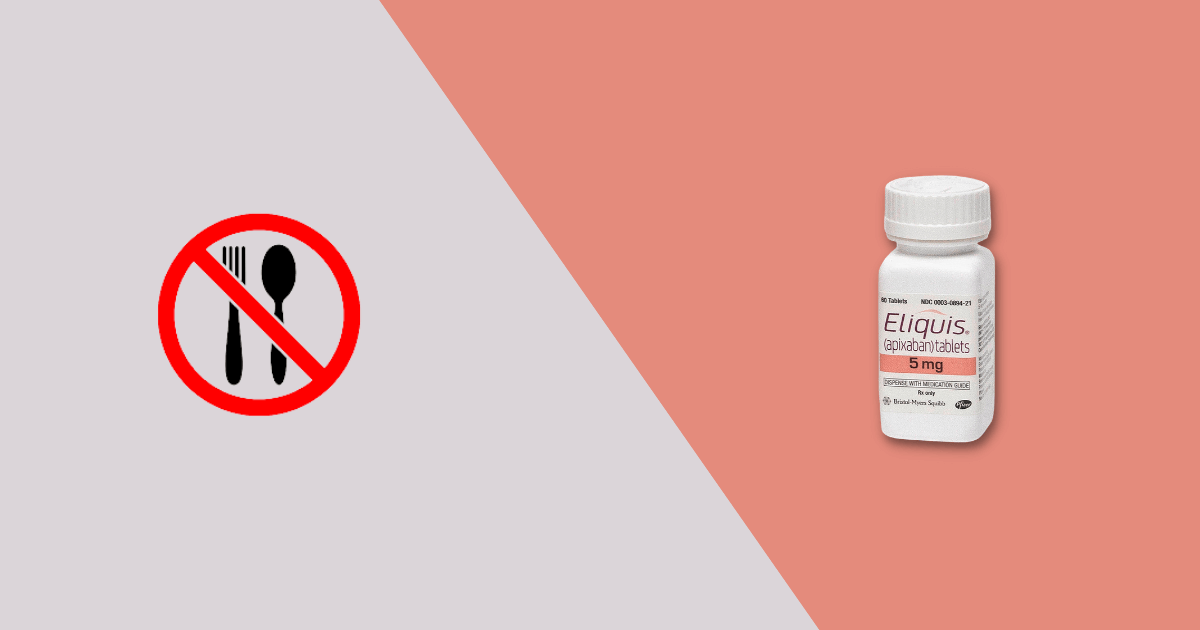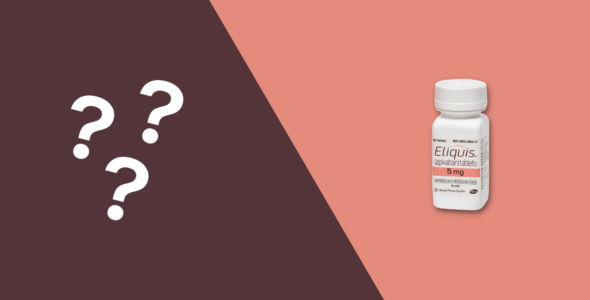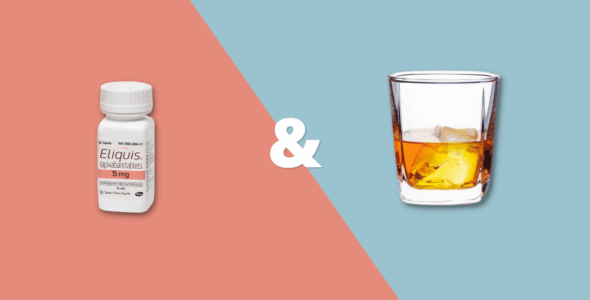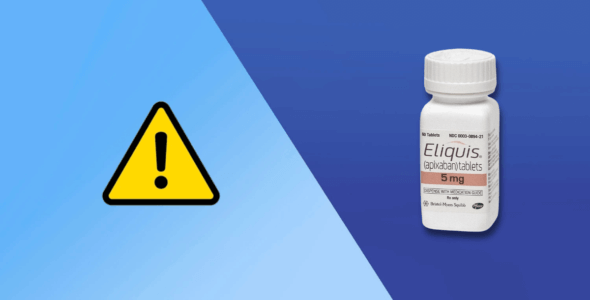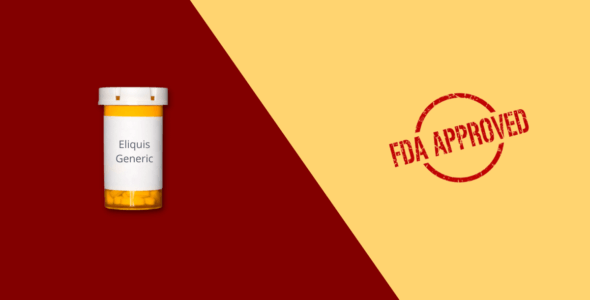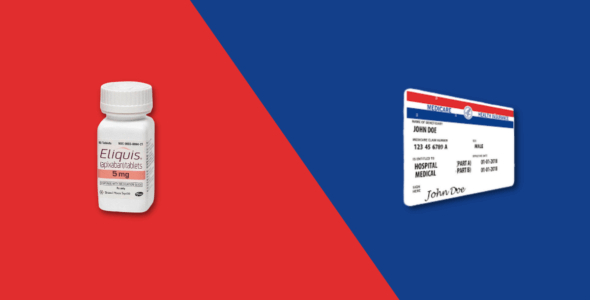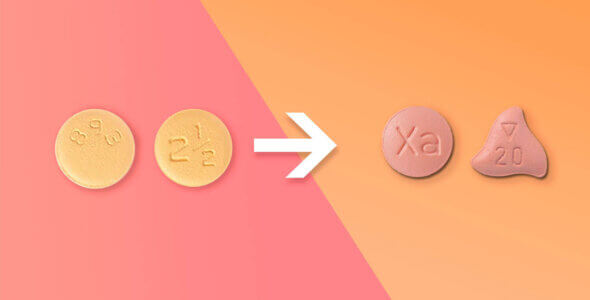What foods to avoid while on Eliquis
Table of contents
Eliquis is an anticoagulant medication used to prevent and treat blood clots. It is important to avoid foods such as grapefruit and other medications that can increase your risk of bleeding while taking this medication.
What is Eliquis?
Eliquis is the brand name for the medication apixaban, manufactured by Bristol-Myers Squibb and Pfizer. It is an FDA-approved prescription medication that is part of a class of medicines called anticoagulants and is used to prevent blood clots that can cause a stroke or heart attack. Eliquis works by inhibiting the activity of certain clotting proteins in the blood. This action helps to reduce the risk of blood clots, strokes, and other serious cardiovascular events.
Eliquis is used for a variety of medical conditions in adults including:
- to prevent a blood clot from forming in the heart of people with an irregular heartbeat (atrial fibrillation) and at least one additional risk factor.
- to treat blood clots in the veins of your legs (deep vein thrombosis) and in the blood vessels of your lungs (pulmonary embolism), and to prevent blood clots from re-occurring in the blood vessels of your legs and/or lungs.
How does Eliquis work?
Eliquis helps to prevent blood clots by:
- inhibiting the activity of certain clotting proteins
- reducing the risk of blood clots, strokes, and other serious cardiovascular events.
Eliquis is typically taken twice daily. The risk of bleeding may be increased when Eliquis is taken with certain other medications, such as aspirin or other blood thinners. It is important to avoid foods that can increase your risk of bleeding while taking this medication.
If you miss a dose of Eliquis, take it as soon as you remember. If it is almost time for your next dose, skip the missed dose and take your next dose at the regular time. Do not take two doses of Eliquis at the same time.
What are the side effects of Eliquis?
Eliquis can cause mild to severe side effects. The most common mild side effects of Eliquis include:
- bleeding
- bruising more easily than usual
- fatigue
- anemia (low level of red blood cells)
More serious side effects include:
- allergic reaction
- bleeding
- increased risk for blood clots if you stop taking Eliquis early
- blood clots in your spine with spinal procedures
New oral anticoagulants (Pradaxa, Eliquis, Xarelto) are not affected by vitamin K and do not have these dietary restrictions. Vitamin K is a nutrient found in high amounts in spinach, kale, and collard greens.
Eliquis comes with a black box warning. A black box warning is the most serious type of warning issued by the U.S. Food and Drug Administration (FDA). It alerts doctors and patients about potential risks associated with a medication.
Eliquis may also interact with certain medications and foods. It is important to avoid foods and drinks that can increase your risk of bleeding while taking this medication.
If you are taking Eliquis, it is important to speak with your doctor or pharmacist about all of the prescription medications, over-the-counter medications, vitamins and supplements you are taking.
What foods should I avoid while taking Eliquis?
You should avoid eating grapefruit or drinking grapefruit juice unless your doctor instructs otherwise. Talk to your doctor about other foods that may interact with Eliquis and increase your risk of bleeding.
Eliquis is not known to interact with coffee and green leafy vegetables that are known to contain high levels of vitamin K which can affect a different anticoagulant called warfarin (Coumadin and Jantoven) that needs your body to keep a balance between the amounts of vitamin K and warfarin in your system.
Get your Eliquis medication for only $49 per month
Get StartedWhat are the best foods to eat while taking Eliquis?
There are no specific foods that you need to eat while taking Eliquis, but eating a healthy and balanced diet is always important. A healthy diet includes:
- fruits and vegetables
- whole grains
- lean protein
- low-fat dairy
Eating a healthy diet can help you manage your weight, blood pressure, and cholesterol. This can in turn reduce your risk of developing heart disease, stroke, and other conditions.
If you have any questions about what to eat while taking Eliquis, talk to your doctor or dietitian. They can help you create a healthy eating plan that is right for you.
Who can take Eliquis?
Eliquis is a prescription medication that is used to prevent blood clots from forming in people who have atrial fibrillation (a heart condition that causes an irregular heartbeat) and are also at risk for developing a blood clot. Eliquis is also used for the treatment of deep vein thrombosis (DVT) and pulmonary embolism (PE).
Eliquis should be taken exactly as prescribed by your doctor. This prescription drug is not suitable for some people. To make sure it’s safe for you, tell your healthcare professional if you:
- have ever had an allergic reaction to apixaban or any other medicine
- are trying to get pregnant or are already pregnant
- have kidney or liver problems
- have had a recent surgery or spinal injury
- have any injuries that are currently bleeding a lot such as a wound
- have a stomach ulcer
- have antiphospholipid syndrome
- have ever had surgery to replace a heart valve
It is important to tell your doctor about all other medications you are taking, including over-the-counter drugs, vitamins, and herbal supplements, as they may interact with Eliquis. Eliquis may also interact with other medications used to treat atrial fibrillation (Afib) or DVT/PE.
Can I take Eliquis with other medications?
Yes, you can take Eliquis with other medications. However, you should speak to your healthcare provider about all other prescription medications, over-the-counter medications, vitamins, and supplements that you are taking, as there may be drug interactions. In particular, you should avoid taking Eliquis with aspirin or other blood thinners, as this may increase your risk of bleeding. Examples of other anticoagulant medications include:
- Xarelto (rivaroxaban)
- Pradaxa (dabigatran)
- Savaysa (edoxaban)
- Arixtra (fondaparinux)
- Fragmin (dalteparin)
- Lovenox (enoxaparin)
- Jantoven (warfarin)
- heparin
You should also avoid taking Eliquis with non-steroidal anti-inflammatory drugs (NSAIDs), as this may also increase your risk of bleeding.
Medically reviewed
A medical professional has reviewed this article.


Jamie Winn, PharmD
Jamie Winn, PharmD
Dr. Jamie Winn received his Doctor of Pharmacy in 2002 from the University of South Carolina College of Pharmacy, Columbia, SC. Jamie is a medical reviewer for NiceRx.

